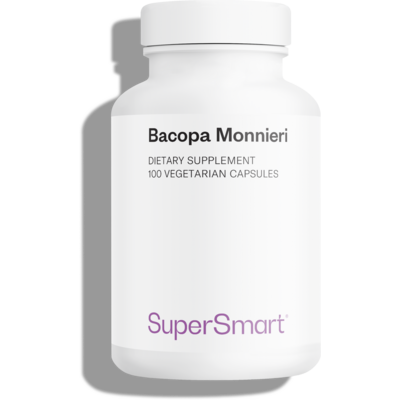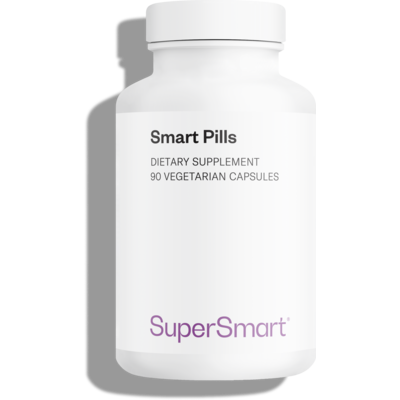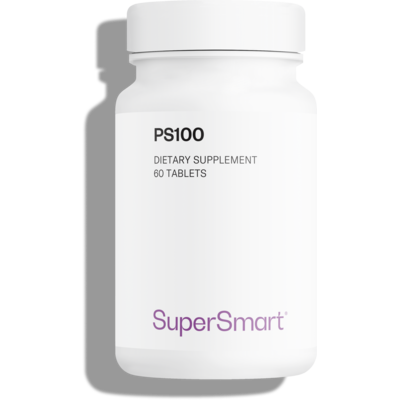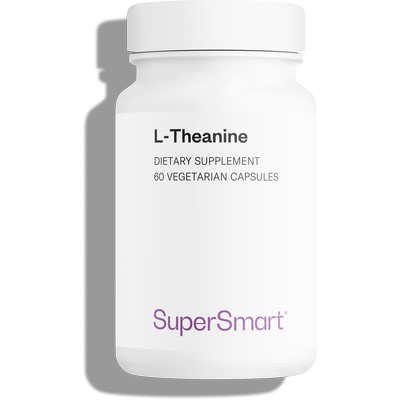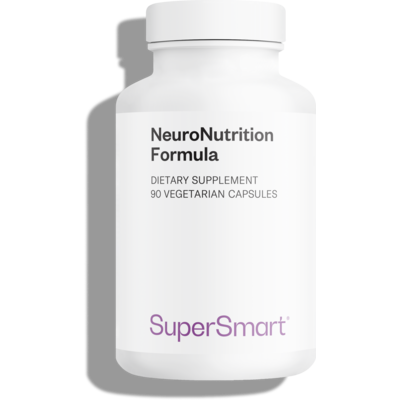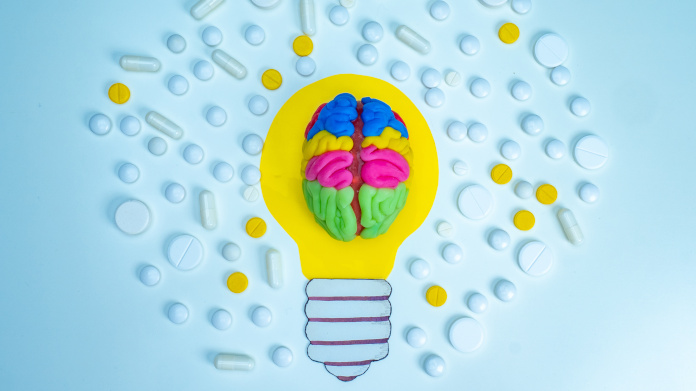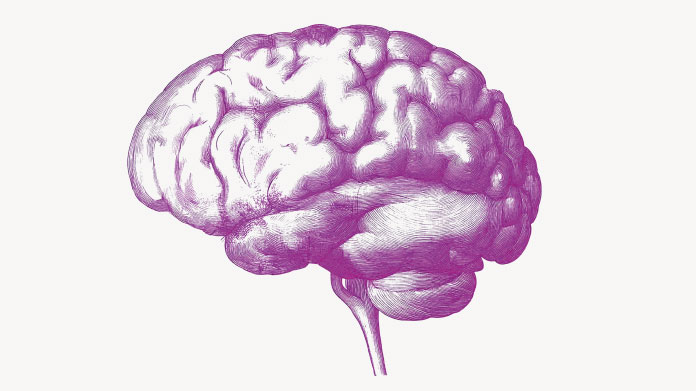A study shows creatine to be a powerful brain booster
A popular supplement for bodybuilders, creatine could also boost our brains, according to a scientific study published in 2024. Let's find out how.

What is creatine?
Creatine is a substance naturally synthesised by our bodies from 3 amino acids: arginine, glycine and methionine.
The pancreas, liver and kidneys produce around 1 to 2 g a day, i.e. about half of our daily intake.
In omnivores, the other half is provided by the diet, more specifically animal products such as red meat and dairy products (1).
Vegetarians, on the other hand, must rely solely on endogenous production.
Creatine is transported in the bloodstream to the muscles as a priority, with 95% of the human body's creatine concentrated in muscle tissue (2).
The rest is stored in the heart, testicles and brain. Its main biological function is to support cellular energy production.
When it enters cells, it binds with phosphate to form phosphocreatine.
This accelerates the recharging of ATP (adenosine triphosphate), which is the main source of energy for myocytes (muscle cells) (3).
This is why bodybuilders particularly appreciate creatine supplements to optimise their training and, more specifically, to improve their explosiveness.
It has been established that creatine increases physical performance during short-term, high-intensity exercise sessions (4).
Creatine is a cognitive stimulant, according to one study
What if creatine also affected the brain?
That’s the possibility raised by a 2024 study published in Scientific Reports, which points to a potential nootropic effect — an ability to enhance cognitive and cerebral function — during periods of intense fatigue (5).
In this randomised, controlled, double-blind crossover trial, 15 healthy subjects were subjected to 21 hours of sleep deprivation on two occasions over a minimum period of 5 days.
During both experiments, each participant received a single dose of creatine (0.35 g/kg) and a placebo, in random order.
They then carried out a series of cognitive tests at intervals of 3 hours, 5.5 hours and 7.5 hours after the product was administered.
Creatine was found to induce changes in high-energy brain phosphates, leading to improved cognitive performance and faster information processing.
A systematic review published in 2024 supports this hypothesis (6).
It suggests that creatine monohydrate supplementation has significant benefits for cognitive function in adults, particularly in terms of memory and attention span.
Women, adults aged between 18 and 60 and people suffering from certain health conditions would be the most likely to benefit.
Creatine and nootropic substances: brain-boosting nutrients you should know about
What type of creatine should I choose?
When it comes to supplementation, the forms of creatine that are best tolerated from a digestive standpoint are those that are most soluble in water: the more soluble they are, the less likely they are to 'precipitate' and cause gastrointestinal discomfort.
With this in mind, choose creatine in its active monohydrate, pyruvate and phosphate forms (all three combined in our synergistic 3-Creatine formula) (7).
When it comes to brain nutrition, there are other, more conventional alternatives to creatine.
The role of phosphatidylserine on neurons
A member of the phospholipid family, phosphatidylserine is a major component of neuronal membranes.
Concentrated in their inner leaflet, it directs the action of protein kinase C, which is involved in the processes of memorisation and learning (in PS 100, it is associated with DHA, an omega-3 fatty acid that helps maintain normal brain function) (8-9).
Bacopa monnieri and memory
Widely used in Ayurvedic medicine, the nootropic Bacopa monnieri plant has also captured the interest of neuroscience experts as a 'memory booster'.
In addition to its strong antioxidant potential, it is thought to regulate the synthesis of certain neurotransmitters (including acetylcholine, which helps to consolidate memories) while improving cerebral blood flow (10).
These properties are essentially attributed to its bacosides (which is why our Bacopa Monnieri extract is standardised to 20% bacosides).
Alpha-GPC, sodium R-lipoate and L-phenylalanine
Some of the latest generation ingredients have recently strengthened the arsenal of substances dedicated to neuroprotection.
These include alpha-GPC and sodium R-lipoate, which increase the production of acetylcholine, and L-phenylalanine, a precursor of tyrosine considered to be a 'stimulant' of cerebral energy (all these cutting-edge compounds can be found in the exceptional Neuro-Nutrition Formula) (11-13).
Green tea's L-theanine and attention
Research has also focused on the effects of L-theanine in green tea on cognitive function.
Already known for its relaxing effects, this psychoactive molecule is also thought to have an impact on attention, working memory and executive functions (our L-Theanine supplement offers a powerful dose of 400 mg a day) (14).
Some formulations combine L-theanine with Bacopa monnieri to refocus its action on cognitive activity (like Smart Pills, which also contains vitamin B12, taurine, caffeine and an extract of Gingko Biloba, associated with improved cerebral reactivity) (15).
SUPERSMART ADVICE
References
- Kreider RB, Stout JR. Creatine in Health and Disease. 2021 Jan 29;13(2):447. doi: 10.3390/nu13020447. PMID: 33572884; PMCID: PMC7910963.
- Wu SH, Chen KL, Hsu C, Chen HC, Chen JY, Yu SY, Shiu YJ. Creatine Supplementation for Muscle Growth: A Scoping Review of Randomized Clinical Trials from 2012 to 2021. 2022 Mar 16;14(6):1255. doi: 10.3390/nu14061255. PMID: 35334912; PMCID: PMC8949037.
- Kurosawa Y, Hamaoka T, Katsumura T, Kuwamori M, Kimura N, Sako T, Chance B. Creatine supplementation enhances anaerobic ATP synthesis during a single 10 sec maximal handgrip exercise. Mol Cell Biochem. 2003 Feb;244(1-2):105-12. PMID: 12701817.
- Wax B, Kerksick CM, Jagim AR, Mayo JJ, Lyons BC, Kreider RB. Creatine for Exercise and Sports Performance, with Recovery Considerations for Healthy Populations. 2021 Jun 2;13(6):1915. doi: 10.3390/nu13061915. PMID: 34199588; PMCID: PMC8228369.
- Gordji-Nejad A, Matusch A, Kleedörfer S, Jayeshkumar Patel H, Drzezga A, Elmenhorst D, Binkofski F, Bauer A. Single dose creatine improves cognitive performance and induces changes in cerebral high energy phosphates during sleep deprivation. Sci Rep. 2024 Feb 28;14(1):4937. doi: 10.1038/s41598-024-54249-9. PMID: 38418482; PMCID: PMC10902318.
- Avgerinos KI, Spyrou N, Bougioukas KI, Kapogiannis D. Effects of creatine supplementation on cognitive function of healthy individuals: A systematic review of randomized controlled trials. Exp Gerontol. 2018 Jul 15;108:166-173. doi: 10.1016/j.exger.2018.04.013. Epub 2018 Apr 25. PMID: 29704637; PMCID: PMC6093191.
- Kreider RB, Jäger R, Purpura M. Bioavailability, Efficacy, Safety, and Regulatory Status of Creatine and Related Compounds: A Critical Review. 2022 Feb 28;14(5):1035. doi: 10.3390/nu14051035. PMID: 35268011; PMCID: PMC8912867.
- Newton AC, Koshland DE Jr. Phosphatidylserine affects specificity of protein kinase C substrate phosphorylation and autophosphorylation. 1990 Jul 17;29(28):6656-61. doi: 10.1021/bi00480a015. PMID: 2397206.
- Noguès X. Protein kinase C, learning and memory: a circular determinism between physiology and behaviour. Prog Neuropsychopharmacol Biol Psychiatry. 1997 Apr;21(3):507-29. doi: 10.1016/s0278-5846(97)00015-8. PMID: 9153070.
- Aguiar S, Borowski T. Neuropharmacological review of the nootropic herb Bacopa monnieri. Rejuvenation Res. 2013 Aug;16(4):313-26. doi: 10.1089/rej.2013.1431. PMID: 23772955; PMCID: PMC3746283.
- Aguiar S, Borowski T. Neuropharmacological review of the nootropic herb Bacopa monnieri. Rejuvenation Res. 2013 Aug;16(4):313-26. doi: 10.1089/rej.2013.1431. PMID: 23772955; PMCID: PMC3746283.
- Jiang T, Yin F, Yao J, Brinton RD, Cadenas E. Lipoic acid restores age-associated impairment of brain energy metabolism through the modulation of Akt/JNK signaling and PGC1α transcriptional pathway. Aging Cell. 2013 Dec;12(6):1021-31. doi: 10.1111/acel.12127. Epub 2013 Jul 29. PMID: 23815272; PMCID: PMC3819405.
- Pilotto A, Zipser CM, Leks E, Haas D, Gramer G, Freisinger P, Schaeffer E, Liepelt-Scarfone I, Brockmann K, Maetzler W, Schulte C, Deuschle C, Hauser AK, Hoffmann GF, Scheffler K, van Spronsen FJ, Padovani A, Trefz F, Berg D. Phenylalanine Effects on Brain Function in Adult Phenylketonuria. 2021 Jan 19;96(3):e399-e411. doi: 10.1212/WNL.0000000000011088. Epub 2020 Oct 22. PMID: 33093221.
- Baba Y, Inagaki S, Nakagawa S, Kaneko T, Kobayashi M, Takihara T. Effects of l-Theanine on Cognitive Function in Middle-Aged and Older Subjects: A Randomized Placebo-Controlled Study. J Med Food. 2021 Apr;24(4):333-341. doi: 10.1089/jmf.2020.4803. Epub 2021 Mar 22. PMID: 33751906; PMCID: PMC8080935.
- Field BH, Vadnal R. Ginkgo biloba and Memory: An Overview. Nutr Neurosci. 1998;1(4):255-67. doi: 10.1080/1028415X.1998.11747236. PMID: 27414695.
Keywords
1 Days
repeat customer
recommended by my doctor. easy to create an account. Discounts and specials are appreciated. packaging and delivery is dependable. Capsules easy to digest. I've had some some capsules and tablets that are broken inside their bottles.
Kokee
5 Days
Order was shipped on time and packaged…Wonderful Jobs!
Order was shipped on time and packaged excellently.
DMHoge
11 Days
great products and prices
great products and prices
Marie
17 Days
Easy to navigate site
Easy to navigate site, had what I was searching for, good price. easy order-check out
James Tucker
23 Days
My skin is clearing up nicely!
Pretty good for my skin so far.
Christian
26 Days
The new packaging is excellent
The new packaging is excellent - finally! No more squashed boxes and torn envelopes.
GORAN
26 Days
Great Product
Great Product
Larry Garrett
31 Days
Quick shipping
Quick shipping; good price. No issues!
Mary McCarty
32 Days
Thr product is very good and is helping…
Thr product is very good and is helping me on my health. Then is always on time
LUGO Luz
35 Days
Buying was fine
Buying was fine. I had problems with the website not recognizing my login info, and had to call to get it fixed. Other than that, everything was good.
David S. Clark
35 Days
Your super maca and super ginseng are…phenomenal
Your super maca and super ginseng are phenomenal supplements that compliment each other when taking them together. Fantastic feeling of well-being and lots of mid day energy without the crash.
Keith Mason
38 Days
I have had amazing results with every…
I have had amazing results with every supplement I've purchased. I am extremely satisfied with this company
kirstin Torres
38 Days
Fine products
Fine products . They are on the leading edge of online supplements. The only issue -so far-is they sometime run out of subscription items.
Jason Argos
41 Days
The ordering process is very user…
The ordering process is very user friendly and the products always come in a timely manner.
CARTER Rhonda
42 Days
The price for Dr
The price for Dr. Pero's AC-11 is reasonable and in line with his views. (my former colleague). Keep it pure.
CAMPBELL Clayton


